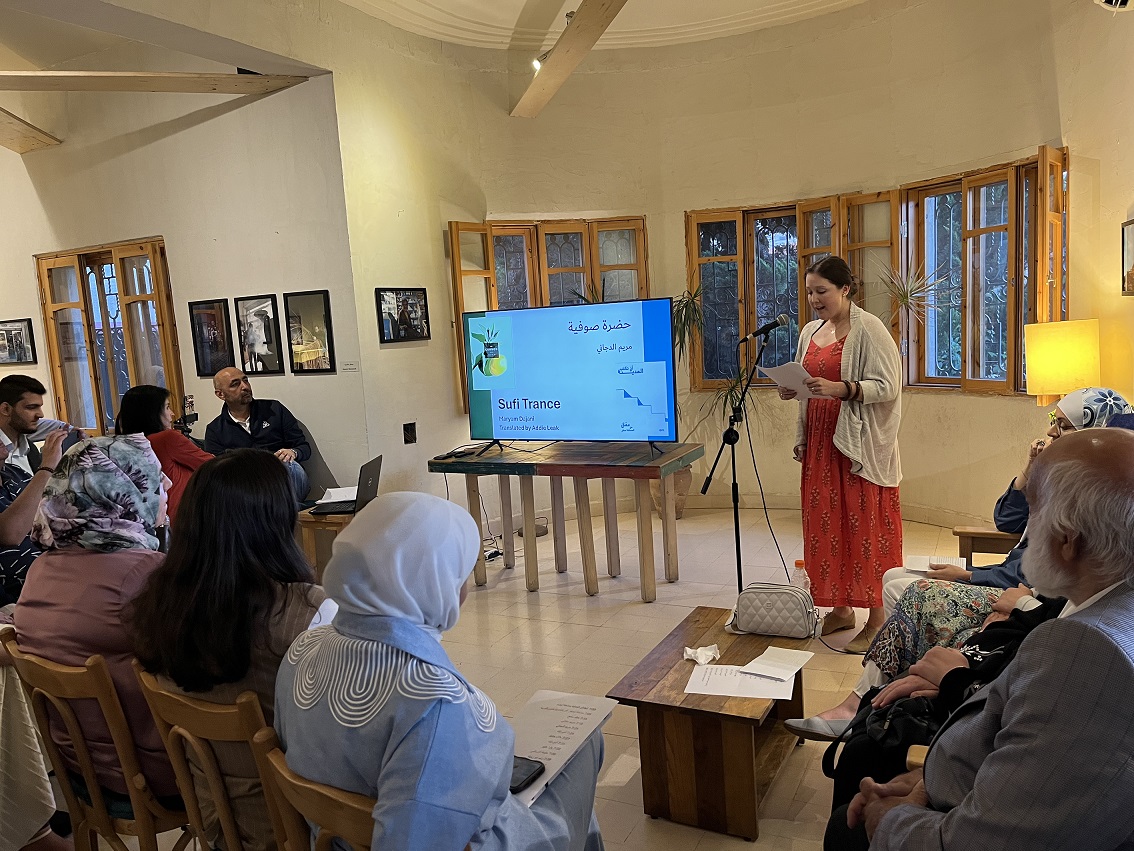Translated by ANDREW LEBER
1
My life would have been a lot easier if only my grandmother had not been a liar. Or, to put it more nicely, if she hadn’t been so imaginative on that winter night when she convinced me that she would never leave me. If she had informed me that she would die, then I wouldn’t have become so naïve. I’m not sure my story is all that important, or whether I even have a story in the first place—at the end of it all, I stand a defeated woman, one who has faced disappointment again and again. But that’s not important now. The important thing is how that woman spoiled me completely.
Perhaps you’ve noticed that I don’t speak of her with any particular respect. This is because she wasn’t my grandmother in the traditional sense of the word. She was more of an eccentric friend spouting nonsense left and right. That silly woman spoiled me, letting me think the whole time that she would live forever. Just like the giant cypress tree in the courtyard of our house. She sometimes spoke of my grandfather, telling me how he had planted the cypress when he was a young man and had died long before its end: The tree lived on for many years, until my uncle decided to cut it down to build an extra room for his second wife. That was after his first wife bore him only girls; rather than see his line of descendants cut off, he decided to cut down the tree.
I told my grandmother that the tree had bled all over the place before falling on the ground with an awesome crash. I told her, “I can’t sleep—it doesn’t stop moaning all night long.”
She hugged me and whispered gently, “Don’t be silly! Trees bleed, but they don’t moan.”
You see? I believed everything! Everything she said on the spur of the moment immediately became an unchanging fact of life. She told me once, “You’re a princess; don’t behave like the other children! They should have to raise their heads high just to look at you.” I believed her, naturally, and began to act accordingly—and so the other children started to call me “the stuck-up idiot” and keep their distance. She explained that their behavior toward me was only burning envy, because I was a true princess whereas they were only silly children. I didn’t need the friendship of any one of them.
She ordered me to befriend princesses like me instead. She led me to Sleeping Beauty’s chamber and tried to wake her for me to play with, but the princess didn’t stir. We closed the door of the chamber, then went out on tiptoe so as not to spoil things for the handsome prince, since my grandmother said that he was on his way in. Once I tried to kiss a spellbound frog, but it jumped away and fled, which really confused me, as I thought I was doing it a big favor.
My grandmother and I wandered through the forest together and ran into Laila, dressed in her tattered red riding hood and carrying a basket full of rotten k’ak cookies down the very path her mother had warned her away from. Laila’s hair had turned white, and I tried to warn her that they had all died—the grandmother and the mother and the evil wolf too. But my grandmother looked at me reproachfully and said firmly, “Keep out of other people’s business.” I was happy for my friend Cinderella even though she wasn’t a real princess, for she danced the night away in the arms of the handsome prince, who preferred her to all the other girls. I loved the good fairy who made the entire thing possible. I told my grandmother, “Life is so much better when we have the good fairies on our side.” I talked to my mirror at length, and it always assured me that I was the fairest of all the girls—not ugly or sad.
When I bled for the first time, my grandmother was asleep. At night she left me in the care of my princess friends. I still don’t know why she didn’t tell me that even princesses bleed, just like the cypress tree. By the time I bled for the millionth time, her gravestone couldn’t tell me when all the pain would end. Basil leaves covered the graves, stalks standing up fresh and green. Perhaps their sharp smell reached her in the gloom below without her even having to crush the leaves against her nose as she always used to, embarrassing me in front of everyone. The grave told me that I would have to face everything myself.
The judge in the courtroom asked me about the allegations that I had slipped my grandmother poison in order for her to die with dignity, including my husband’s slanderous accusation that I was delirious and hysterical. I answered the judge politely: “Princesses, Sir, do not discuss the particulars, for it does not befit them to speak like ordinary people.” He ruled in favor of divorce, and denied me custody of my little girl out of concern for her safety.
The day they took me out of the house for the last time, I embraced my daughter. She was wailing, and so I whispered into her ear, “You will bleed a lot, my little princess—be sure never to cry.”
2
That girl ruined my death. She didn’t let me rest in peace like the living who eventually let go of their loved ones—all the others manage to accept that God gives and God takes away, so why couldn’t she?
I never once told her that I would live forever. She was so self-absorbed that she ignored my yearning to be done with life, and only kept repeating stupidly, “You’ll get better!”
Better than what? What about the shooting pains and the chills that pierced my hollow bones? Pain after pain wore out my body, each one diagnosed by doctors in the clinic as perfectly ordinary, even as my mind remained remarkably quick and active for someone as elderly as me. If only I had first been hit by a stroke, which would have freed me from the prison of consciousness. The pain might go on, but that hateful little blob inside the hollow of my head would stop broadcasting it, stop the fear that keeps the brain vigilant and alive. If only she could simply nod off for a while and leave my tattered body to drift into unconsciousness once and for all.
Maybe her desire to keep me from leaving was the cause of all the trouble. I wasn’t exactly old when I became her grandmother. If my own daughter hadn’t been so quick to marry and then so quick to die, my granddaughter wouldn’t have tried to keep me around forever and we wouldn’t have been so closely bound together.
But what happened, happened. I always had to make it clear that she was my granddaughter and not my daughter, because I didn’t seem like a typical grandmother: sickly sweet manner, large flabby breasts, and infuriatingly curious about everything. Yet despite the ongoing tension that colored our relationship, we became close friends. I was always worried about how fragile she was and how easily affected by others. She had the best of intentions toward everything. I tried to warn her about how exceptional she was. I wanted to protect her, wrap her up in warmth so that her spirit didn’t suffer from the frost of repeated loss. I wanted her not to expect too much from others, since that always leads to sadness.
But that was when she was a child—I didn’t want to interfere in her life afterward. I wanted her to have complete freedom, to be free as oxygen itself!
I stood aside as her womanhood advanced, surprisingly quickly, and tried to simply celebrate her femininity like any good grandmother, but she still came to me sad and confused every time love touched her heart. I felt forced to say something, about the need for her to take pride in just being herself, which she later called “Grandma’s controversial opinion.” Yet my opinion didn’t make much of a difference when she took the decision to get married. When she brought the young man to meet me, I took her aside and said, “He doesn’t suit you, there’s a certain slowness to him, and he doesn’t seem to have any imagination. He’ll only bring you misery.”
Afterward—I mean just a few years later—the distinctive sparkle that she had always had in her eyes was extinguished, all at once. Yet she never spoke a word about it, and simply implemented my earlier teachings on the importance of rising above her sorrows.
On her last visit she seemed more broken-down still. She sat silently near the bed where I lay hooked up to a number of machines. The pain had grown stronger. She started to talk to me about her little girl. She tried to get me to remember things past—the times when I used to walk her to school and insisted she wear a wool cloak despite the warm weather, causing a commotion among her classmates, who found me quite eccentric.
She kissed my hand and patted my wrinkled face with her palm as she said, “You’re still the prettiest woman of them all, crazy old grandmother.” I told her weakly, “I’m in a lot of pain, my little one… I’ve had enough.”
She replied in irritation, “I’m not little anymore; I’m over forty!” She kissed my forehead, left for a few minutes, then came back with a cup of hot tea.
Did she prop me up as she held up the cup for me to sip that sweet, sweet tea? Did she hum the same songs that she fell asleep to in my arms during her childhood? Go to sleep, now, go to sleep… Did my hands shake violently before she took them in her hands, smiling as her tears poured forth freely? She said, conspiratorially and gently: “Everything will be over now.” I realized then why she had put so very much sugar into the tea. My spirit gave a leap of joy and prepared to depart, as a thick fog rolled in and everything else departed. Death came in like an impossible lover. Yet her bitter sadness prevented my peaceful slumber.
I don’t want to trouble her dreams again. I won’t haunt her, for the dead help no one living. She must stop being sad, and face everything on her own. I won’t give in to any emotional blackmail from her. She needs to stop calling on me every time she’s overcome with nostalgia. I need to die completely now, take back the part of me that lives on in her memory, so as to free myself completely, and so that my little girl can master the art of loneliness as her grandmother did before her.
Basma Al-Nsour is a Jordanian short story writer and attorney. She has a weekly column in al-Araby al-Jadeed newspaper and is editor in chief of Tayki magazine, which focuses on women’s literature. She has published several short story collections. Her work can also be found in translation in Banipal and Snow in Amman: An Anthology of Short Stories from Jordan.
Andrew Leber is a PhD student at Harvard University’s Graduate School of Arts and Sciences, Department of Government. His writings and translations have previously appeared in The New Arab, Guernica, the New Statesman, and AGNI Online.
[Purchase your copy of Issue 11 here.]
[Read more Arabic fiction in Issue 15.]




